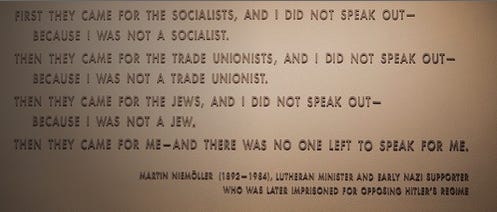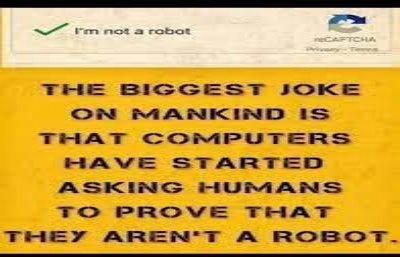Thoughts on USA2024, and 9 suggestions to make them work
USA2024 = disinformation apocalypse? Maybe. But how, exactly? THAT is important
Could the US 2024 presidential election really be an "AI-driven disinformation apocalypse"? Maybe, but even if that happened it would be surely due to a combination of AI and other, hardly digital factors, interacting in different ways than most people think. Let's look at the main ones.
DISCLAIMERS: I am not American, I don't live in the US and, with the unavoidable exception of the first paragraph, this is not a "my country is better than yours" post, in any way. I am just sharing my own personal understanding, without any pretense of completeness or even correctness, of how the US is going towards Nov. 5th, 2024 and why. Polite corrections, critiques and pointers to relevant reading material are sincerely welcome.
Second, any US "internal" event of magnitude similar to USA2024 is never "internal", as it concretely affects every other country. These days, for example, I'm pretty sure that who gets the White House next year, and how the whole USA2024 campaign will cope with current events, have a non-negligible effect on the probability of terrorist acts here in Italy. We don't demand to vote, but if I or any other non-American follow, comment or criticize USA2024, it's because we too will bear some consequence if it's broken.
The messiest voting, bar none
In the U.S., trust in election security and integrity is pretty low. From here, the root cause is how uselessly complicated Americans make EVERYTHING related to voting.
Demography and the economy, of course
Depending on who you ask, delocalization instead of better jobs at home is a failure of liberalism, or its working just as intended Either way, the resulting alienation and dangers have driven many American workers of all conceivable identities further to the cultural right.

Many "non-white" US voters are more religious than "white" ones, and many of the former also think that the "more educated and upscale" US Democrats just look down on patriotic people who still value hard work. This, I read, may be enough to "tilt the electoral balance of power". But if enough GenZ members wake up to vote, they may just as well tilt the balance in the opposite direction. At the same time, greater propensity to voting among older Americans may promote candidates of any color that promise "short-term benefits instead of larger but future ones". Basically, it seems that almost anything, including electric cars, or the rift between suburban drivers and urban e-bikers may "tilt the balance" of USA2024. And why bother anyway, if the moment Texas turns blue, which may be pretty soon, "no Republican will ever again win the White House"?
In a landscape like this, I honestly don't get why any US voter should bother to read any voting predictions.
Intolerance, polarization and lack of trust in the system
"News consumption is down, political donations are dwindling, yard signs are being shoved into attics": many Americans seem happy with "politics of nothing" where the only "radical" position is self-care. The still active ones, instead, live in worlds so partisans that even scholars would consider "highly segregated", where even sending the other side's candidate to prison doesn't seem enough.
On one side, good faith advocates for the rights of all minorities religiously believe (paraphrasing from here) that it's just WRONG to remind Texan conservatives that "Medicare expansion would help 1.4 million uninsured Texans" before making the same Texans agree that everybody has a divine right to autonomously choose which sport contests or bathrooms to enter. On the other side, there are Evangelicals, of all people, dismissing literal quotes of Jesus because "[even] that doesn't work anymore. That's weak".
34% of US Democrats complain that "there is too much freedom" in the Land of the Free, and many college applicants avoid entire states for political reasons.

Even in theory, there is only one possible outcome of all these refusals of any compromise period, no matter how small the issue is: to force everybody to behave in exactly the same way, all the time. The end result of this neverending twisting of the Niemöller spirit into "a horrible model for being an effective agent in a democracy" may be the refusal of "the most important tenet that underpins democracy, that is the very acceptance of the USA2024 elections and their results, by whatever side loses.
Search engines and social media that influence voting
If the Internet didn't exist, all the issues mentioned so far would surely exist anyway, albeit in very different, likely less serious forms. At the same time, the impacts on elections and democracy of the digitization of relationships is impossible to deny.
If voting behavior is increasingly driven by "alignment on social and cultural questions", for example, it's impossible to have sane elections with social media which, being designed to profile people exclusively for profit and control, must promote, among all the possible "alignments" exactly the sociocultural ones that most divide and incite people.
Search engines aren't better. Any search engine that wanted to "fix" an election could alter the order of search results for any candidate, in ways almost impossible to notice, let alone prove, but still effective on undecided voters. In a recent experiment of this kind, 75% of participants did not even suspect they were given results altered to favor a candidate, and yet those results increased by 48.4% the preferences for that candidate.
AI = much more of the same. But how?
First of all, never accept any discourse that "AI" could take over elections, or anything else for that matter, because it's never "AI": it's the very small number of people who control AI. AI has no life of its own, and must never have one.
AI is opaque, easy to control and hard to predict. Therefore, even good faith attempts to use something with such issues to make USA2024 more informed, transparent and democratic may backfire badly. Projects to hunt down voter fraud with AI, for example, may make filing voter challenges so easy to neuter all voting procedures in whole states. AI bots are also pretty gullible. During a recent test, more than 85% of AI queries to generate disinformation about security and integrity of US elections were accepted.
This said, AI may indeed facilitate very cheap hyper-customization of influence, in ways and at scales impossible with "normal" social media. Recognizing and blocking someone who posts the SAME content thousands of times is trivial. Many thousands of slightly different posts, instead, would be "far less likely to get caught", especially if they were answers. The problem, that is, is not "Artificial General Intelligence", but Artificial GENERIC Dialogue.
If cheap AI chatbots, are already able to start or sustain countless human-like generic conversations, they may help prepare the right general atmosphere for concerted campaigns, bringing "echo-chamber partisanship" to new levels. In some moments, the chatbots may "comment" so much and so often that certain topics or opinions are not acceptable, in ways impossible to detect in real time with automatic content filters, to make online conversations among humans stop altogether. That would leave physical bars, gyms, squares and such the only places where humans could discuss politics, so maybe it wouldn't be bad.
The really dangerous impact on elections of AI-powered social media
An interesting thesis about civilization argues that prehistoric human groups, being not bigger than the "Dunbar Number" (about 150), could get things done only by raw social power. Such groups would be "gossip traps" that forced all their members to "discuss mostly people", because being popular was the primary concern of everybody aiming to lead, and social pressure the primary mode of dispute resolution. Sounds familiar?
This, says the story, made progress extremely slow for about 90,000 years, because both fruitful debates and development of new ideas are almost impossible when all energies must go into "reputation management". Even more familiar?
Eventually, however, community sizes grew so much to make organizing by gossip alone impossible. This forced people to invent civilization, defined as "some superstructure that levels leveling mechanisms [thus bringing] immunity to gossip".
This kinda worked... until ~15 years ago, when smartphone-borne social media designed to short-circuit every "communication" and collapse all contexts and barriers put ruling by gossip and unbounded social manipulation back in power, this time in a flash, and at the planetary rather than village scale.
This becomes quite relevant for USA2024, as soon as you match it with two other concepts that... in my opinion should be rewritten first:
"Cyberspace" will bring the end of our species by making everyone "think the same thing at the same time" (M. Chrichton, The Lost World)
"When it comes to politics, social media are greatly overestimated. They move votes way, way less than everybody believes" (some web guru I talked with about 10 years ago)
I disagree. I think that the power of social media on politics and democracy is greatly underestimated, for a reason that looks almost identical to the statements above, but is almost their opposite in practice. I argue that
In general, current social media are gossip traps rebooted, that is serious steps back in history. In politics, they make votes "move", that is BOTH happen AND change, way, way less than everybody believes." That is, democracy may end with USA2024 and in general, but not because everybody gets the same idea. It may end because pre-existing, now digitally enhanced gossip traps are making it much harder, for every single individual, to change whatever idea he or she had in the first place, consequences be damned.
9 suggestions to avoid the gossip traps for USA2024
A necessary part of any complete solution to these problems is to rebuild US voting from the ground up, but that will take years. For USA2024, I'd suggest to:
Boycott every media that endlessly publishes voting polls, and their sponsors. Ditto for every political TV show that allows participants to talk over each other. All that stuff really gives voters are pointless hyperarousal, or apathy
Read, rather than watch news. It's much faster, free of people yelling over each other, and much easier to process critically
Get your news only straight from their sources, via RSS feeds. Search engines and social media are invasive gossip traps designed to waste your time
Choose only reputable sources, but as diverse as possible.
Spend no more than a few minutes per day (30?) to read actual/"breaking" news, no matter how "important" they seem (essays and commentaries don't count)
Ignore all online comments to said news, essays or commentaries, always. Comment as much as you can, but only with people (again, as diverse as possible!) whom you can physically meet
Ignore any content or discussion that does not include sources. REAL ones
Compromise! Purity is great, but alone goes nowhere way too often
(mostly) For progressives: find ways to tear down as many paywalls as possible. You can't whine that the "unwashed masses" are disinformed, or that AI perpetuates evil stereotypes, until too much valuable information is paywalled, but all garbage is 100% free
(yes, it’s mostly obvious stuff, but so are lots of smart things when you think about them)
Shorter version of the 9 suggestions:
get back your time, to think and discuss face to face with humans.
use it pragmatically. Be flexible. Hold your nose.
vote. Always
and get yourself a (possibly paid…) subscription to this newsletter, of course. :-)




